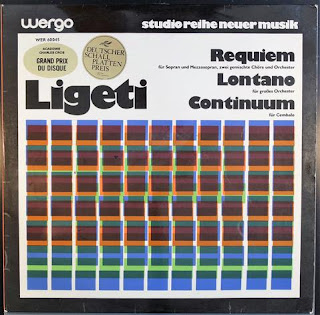Monday, 27 November 2017
Upcycled Robot
"Captain Eyeball And The Last Of The Telescope Men" A lost Republic serial ( 1947)
Sunday, 26 November 2017
CRI





Composers Recordings Inc started as a non-profit label in 1954, founded by the composers Otto Luening and Douglas Moore (and another chap), and dedicated to releasing contemporary classical music by American composers. The distinctive CRI logo is familar to anyone who's spent time in American used record stores flicking through the 20th Century classical section hoping to find electronic and concrete releases. CRI actually put out a bunch of cool electronic and computer music recordings themselves, but the bulk of the 600-plus releases tend to be somewhat forlornly orphaned specimens of astringent modernism using the traditional orchestral palette, piano, voice, etc. You can buy the non-electronic CRI records rather cheap, let's put it like that.
I like the design of CRI releases, especially the ones based around the template of a square surrounded by white (sometimes colored) space on all sides. Some of them are genuinely good, I think . Others fall into the "ugly but interesting" zone - I could imagine them appealing to Julian House for similar reasons to library music covers and Polish movie posters - that wrong-but-right quality. Overall the CRI designs give off a bold, stark, somehow earnest and open aura that fits the spirit of the music. The covers of the non-electronic recordings are actually as characteristic-looking and striking as the electronic/tape/computer ones, but I've mostly stuck with the latter here.
Particularly like the Allan Bryant Space Guitars cover. Ruddy peculiar record, too.
Friday, 24 November 2017
Wergo

Even though they look like some kind of test for colour blindness, I dig these severe (yet slightly garish) designs for Wergo's avant-classical releases.
Later on Wergo broke with the fixated minimalism, switching to a more florid, borderline unsightly design template.

Later on, as New Age and space music oriented releases filter into the discography, you get some tripped-out covers:

Subscribe to:
Comments (Atom)














































